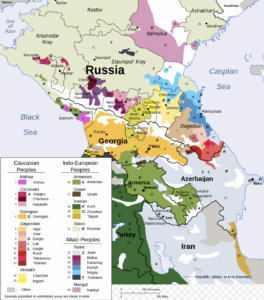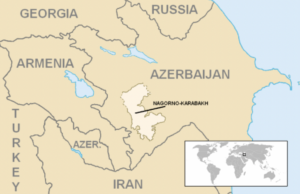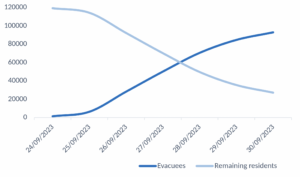While war and atrocity dominate headlines around the world, a largely overlooked conflict in the Caucuses has escalated to ethnic cleansin...
While war and atrocity dominate headlines around the world, a largely overlooked conflict in the Caucuses has escalated to ethnic cleansing of the Christian population from the oldest Christian nation in the world.
For fear of their lives, more than 100,000 Armenians have been forced to flee their ancestral home in Nagorno-Karabakh after Azerbaijan seized total control over the region in September. The 1,700-square-mile mountainous slice of land has been inhabited by Armenians for thousands of years, but it is surrounded by Azerbaijan, a majority Muslim nation that says the region is its territory.
Though the fight is over territory, experts say that at its core, the conflict stems from ethnic and religious differences between Armenians and Azerbaijanis.
“Ethnicity and religion are intertwined. Azerbaijanis may say they do not hate Christians But, when it comes to Armenians — the indigenous population in the region — the Azerbaijanis show no tolerance,” explained Dr. Michael Rubin, a senior fellow at the American Enterprise Institute and expert on the region. “Azerbaijanis recognize deep down that had it not been for Joseph Stalin, they would have no claim whatsoever to Nagorno-Karabakh. The Azerbaijanis realize they have no legitimacy and so target with special animus those who do.”
Yana Avanesyan, a doctoral researcher who is originally from Nagorno-Karabakh, says the religious difference between the two countries plays a major role in the Armenia-Azerbaijan conflict.
“When we say Armenians, we are speaking about us being Christians,” Avanesyan told The Daily Wire. “We know they hate us so much that they will just destroy everything.”
Many refugees from Nagorno-Karabakh are sick and malnourished – Azerbaijan’s military began blockading the region in December of last year, cutting off access to food, electricity and water from the outside. Some are also exhausted after fleeing into Armenia on foot – and Armenia has expressed concern that it may not have the resources to care for such a massive influx of people.
Her family was among the more than 100,000 who fled the region without a place to go. The estimated population of Armenians in Nagorno-Karabakh is roughly 120,000, meaning nearly the entire population have decided to flee.
“War started in Nagorno-Karabakh, and people were forced to flee, and more than 100,000 people — including my entire family, my parents, my sister, my grandma — they were forced to flee their homes,” Avanesyan said. She was finally reunited with her family around a month ago, but they are now struggling to find a place to live after being uprooted from their home.
“There are not enough resources in Armenia and people try to solve their issues by themselves. So we are trying to find apartments or houses for me, my family, and my relatives,” said Avanesyan. “I’m currently trying to find an apartment for my family before we will know what’s going on because the situation now is very uncertain.”
“No one from the displaced people knows what is going to happen to us,” she said.

Ethnolinguistic distribution in The Caucasus Region in 2007 via Wikimedia Commons
Armenia has existed in some form or another for nearly three millennia, and became the first nation to adopt Christianity as its state religion in 301 AD. While it has historically been in the political orbit of Russia, since 2018 it has made significant anti-corruption and pro-democracy reforms, and has been distancing itself from Moscow. It is currently home to about 2.7 million people.
Azerbaijan traces its roots back to the Old Azeris, who were conquered by and intermarried with the Seljuk and later the Mongol Turks between the 11th and 13th centuries. It is predominantly Shia Muslim, although its culture is comparatively secular. Despite its historic and ethnic ties to Iran (more ethnic Azeris live in Iran than Azerbaijan) it is most closely aligned in global politics with Turkey. While it is nominally a republic, it is in fact an authoritarian state controlled by de facto dictator Ilham Aliyev, who was preceded by his father, Heydar Aliyev. It is home to 10.3 million people.
Azerbaijan’s claim to Nagorno-Karabakh, as explained by Rubin, can be traced to Stalin and the Soviet Union, which absorbed both nations.
The Soviets nominally advocated for a universal communist model that would transcend ethnicity and language barriers, but in practice, they often found it prudent to administer regions and subregions based on ethnic divides – the Socialist Republic of Armenia and the Socialist Republic of Azerbaijan were both members of the Union of Soviet Socialist Republics, and the Armenian-majority region of Nagorno-Karabakh was given autonomous status within Azerbaijan.

In the late 1980s, as the Soviet Union began to collapse, the people of Nagorno-Karabakh petitioned to leave Azerbaijan and unify with Armenia – but Azerbaijan refused. What started as a political dispute became a military dispute between the newly independent nations in 1992, in which tens of thousands of people were killed and hundreds of thousands of ethnic minorities in both nations were expelled from their homes.
In the aftermath of the 1994 ceasefire, the ‘Republic of Artsakh’ was allowed to exist as a de facto independent state within Azerbaijan, though no other nation, including Armenia, formally recognized its independence. The uneasy truce persisted for decades in what was widely regarded as a “frozen conflict.”
But that conflict rethawed in 2020 after years of border clashes, and ended with Azerbaijan seizing large portions of the Republic of Artsakh. Russia stepped in to negotiate a truce, and sent peacekeepers into Artsakh, as well as the Tachin Corridor (the only road connecting Nagorno-Karabakh to the outside world) to ensure the continued independence of the region.
The situation changed in February 2022 when Russia invaded Ukraine. As the war dragged on, it became clear that Russia was bogged down and could not commit its forces to another theater, and the Russian peacekeepers who remained in the region did not intervene when Azerbaijan blockaded the Tachin Corridor and cut Nagorno-Karabakh off from the outside world.
“We cannot tolerate any longer having such armed forces on our territory and also a structure which, on a daily basis, challenges the security and sovereignty of Azerbaijan,” said Hikmet Hajiyev, foreign policy adviser to President Aliyev.
A coalition of global organizations called 120,000 Reasons launched a campaign in September that seeks to end the Azerbaijan blockade on Nagorno-Karabakh, and bring attention to what it says is an attempted genocide of the region’s entire Armenian population.
Gev Iskayjan, a resident of Nagorno-Karabakh who recently fled to Armenia, told 120,000 Reasons that “over 99% of the ethnic population of Artsakh has left the area.
“That land that we were on, that Armenians lived on for thousands of years, now, only a handful remain,” Iskayjan said.

Timeline of the flight of the ethnic Armenians from Nagorno-Karabakh via Wikimedia Commons
Azerbaijan has denied claims that it is pursuing genocide or forcing Armenians out. Its claims were undermined after it captured Stepanakert, the capital of the region, when it renamed one of the city’s streets in honor of Enver Pasha, a military officer for the Ottoman Empire who is known as the architect of the last Armenian genocide, which killed more than a million people in the 1900s.
That sent a clear signal to the city’s Armenian population.
“Azerbaijan did not order any Armenians to leave,” Amberin Zaman wrote from Armenia for Al-Monitor. “Yet it ensured that life was so miserable that few would opt to stay. Indeed, even as Azerbaijani authorities rebuffed claims of ethnic cleansing, insisting their forces had struck ‘legitimate military targets,’ eyewitness accounts of rape and indiscriminate shelling that wounded and killed children began to emerge.”
Various Western nations, including the United States, condemned Azerbaijan, and as recently as last month senior U.S. officials said they would not tolerate any action against the people of Nagorno-Karabakh. But in the aftermath of the invasion and dissolution of the Republic of Artsakh there has been no meaningful response. Even Armenia stayed out of the conflict, to the outrage of many of its citizens.
“It is amazing that an ethnic cleansing happened in the 21st century and there is absolutely no reaction from the international community,” political analyst Tigran Grigoryan told NPR. “If this happened somewhere in Europe, I believe [the Azerbaijani leadership] would already be on international wanted lists.”
Iskayjan told reporters that while he and many other Armenians feel “betrayed” by the international community, the incident raises broader questions about the influence of the United States and its allies overseas.
“Policymakers in the United States have to ask themselves, Does our word mean anything?” he said. “If a state actor like Azerbaijan can, at any time, willingly disregard what we say, what does that say about the strength of our State Department and the strength of our foreign policy?”
It’s possible that Azerbaijan believes it has too much leverage to be cowed by Western condemnation – the country is rich in natural gas, and since trade sanctions against Russia have cut Europe off from Russian energy exports, Azerbaijan has stepped in to cover some of the shortfall, with tentative plans to double its gas exports to Europe.
Now that Azerbaijan has secured Nagorno-Karabakh, many observers fear that an emboldened Azerbaijan could push into Armenia proper to seize control of the strategic Zangezur corridor, which would create a direct land route from the Caspian Sea to its close ally, Turkey. Armenia had promised Azerbaijan access to trade throughout the territory as part of the 2020 truce but has since walked back that promise, arguing that Azerbaijan’s presence in the area would effectively mean military occupation.
It’s unclear how other global or regional powers would respond to such an invasion, given the muted response thus far to the seizure of Nagorno-Karabakh. The escalated conflict could produce strange bedfellows, according to foreign policy analysts.
Russia could pivot into Azerbaijan’s camp out of a simple desire to side with the stronger party and minimize its own involvement. Turkey, formally a U.S. ally, is very close to Azerbaijan, and Israel has a strategic partnership with the Azerbaijanis based on their mutual enmity with Iran. India, meanwhile, has been strengthening its ties with Armenia, while Iran is also backing the Christian nation against its regional rivals.
It’s also possible that Armenia could pivot further into the Western camp now that it no longer sees Russia as a reliable protector.
Former U.S. Ambassador-at-Large for international religious freedom, Sam Brownback, has called for greater U.S. support to Armenia and blasted the Biden administration for sending U.S. aid and weapons to Azerbaijan. He also expressed concern that the mass exodus was part of a broader pattern of anti-Christian discrimination around the world.
“We’re seeing another ancient Christian population being run out of the region,” Brownback said. “Most of the Middle East and North Africa, the Christians have all been run out.”
No comments